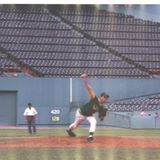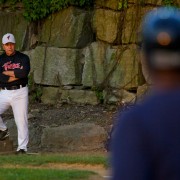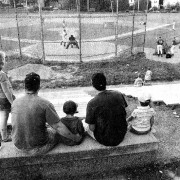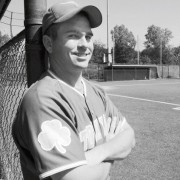Playing for the Love of the Game
My shoulder is held together with fishing line, says veteran righthander Dave Worthley of the Boston Park League’s Towne Club. And he’s not joking. Doctors gave me a 50-50 chance of being able to throw again, but I made it perfectly clear that for me it was 99 percent.
Worthley faced major shoulder surgery and arduous rehab after a career-threatening injury in 1994. Many 25 year old amateur pitchers would have thrown in the towel, but not Worthley. “Everything I do is baseball,” he says. “They’ll have to drag me off the field.” Worthley’s passion embodies the spirit of the Boston Park League: talented ballplayers playing for the love of the game. Worthley regained his All Star form, a credit to his workout regimen which includes training for triathlons. Last season, he won 10 games for the second time in his Park League career, no small feat during a 32 game schedule.
The Boston Park League, founded in 1929, is the longest running amateur baseball league in the country. The league took a step back in time this season, returning to wooden bats after years of playing with aluminum. “Players are going back to the way the game is supposed to be played. They are excited to be swinging wood,” says Secretary Treasurer Walt Mortimer, a 1983 inductee into the Park League Hall of Fame, who has been involved with the league as a player, manager, and umpire since 1954.
Originally funded by the City of Boston, the Park League was sponsored by Budweiser for a few years during the mid 80′s, before the Thomas A. Yawkey Foundation began sponsoring the league, together with individual sponsors. Mortimer remembers playing in the Park League during the 50′s and 60′s when the league could draw over 10,000 fans for a playoff game. While attendance has dropped over the years due to increased entertainment options and competing leagues, the league can still draw several hundred fans for a championship game.
Park League games are played weeknights on public fields throughout the City, from Cleveland Circle in Brighton, to Town Field in Dorchester, to Kelly Field in Hyde Park. Admission is free, but home teams gratefully pass the hat looking for small donations. “It only hurts for a minute!” yells Larkin Club General Manager Howard Stein through the stands at Cleveland Circle.
The Park League features some of the area’s best amateur baseball.
“You have to be a pretty good player to play in the Park League,” says Mortimer. Mortimer, who also umpires college games for the NCAA, says wooden bats make a big difference in the quality of play.
“I had so many college games that were marathons, terrible games,” he says. I’ve seen better games in the last few weeks than I saw all Spring.” For his part, Mortimer was a hard hitting first baseman during his days as a player, spending time in the minors with the Cardinals, Tigers, and Giants, in addition to his career in the Park League. Mortimer was teammates in the Giant system with future major league stars Juan Marichal, Matty Alou, and Manny Mota.
“In 1959, I signed a contract with the Giants in Springfield. The scout said he wanted me to play in Phoenix, but the Giants had some tall black guy there. I think you can hit better than he can,” the scout told me. That black guy was (future Hall of Famer) Willie McCovey. I wonder if that scout still has a job,” laughs Mortimer. But more impressive than the quality of play in the Park League is the attitude of the players.
“I just love playing baseball,” says Derek Grudinskas, designated hitter and co-manager of the Palmer Club.
“As much as you want to win, it comes down to fun. The other thing that keeps me playing is the camaraderie,” says Grudinskas.
“Guys like Dig (Greg Digirolamo), Reils (Brian Reilly), and Russ (Sean Russell). We’ve been together for a while. It’s almost like a family,” says Grudinskas., who adds that his only brother passed away from multiple sclerosis in 1992. Grudinskas grew up in Norwood and graduated from Xavarian Brothers High School in 1988. He played three years of college baseball for the Community College of Rhode Island and Framingham State, but left school without a degree in 1991. Grudinskas returned to school in 1997, attending Bridgewater State. At age 25, but with a year of college eligibility remaining, he made the Bridgewater baseball team and earned a trip to the Division 3 College World Series in Virginia.
“It was the best experience of my life,” says Grudinskas, nicknamed Big Daddy by his Bridgewater teammates. “I wouldn’t trade it for anything.” Grudinskas graduated from Bridgewater State this Spring with a degree in Management Science. This is a big year for Grudinskas, who will be married in September – after the Park League playoffs, or course.
“I wouldn’t have it any other way,” says Grudinskas with a laugh.
At age 42, Rosendo “Junior” Rentas remains one of the most feared hitters in the Park League. Legend has it that Rentas made an appearance with the Boston Red Sox back in the 70′s, a legend perpetuated by the old-style Red Sox batting helmet – red with a faded navy “B” – that Rentas wears to the plate.
“No,” he says with a smile. “Just class A.”
Rentas attended Jamaica Plain High School after coming to Boston from Peurto Rico in 1973., and made his Park League debut that same year. In 1975, Rentas signed with the Red Sox as a catcher and spent a couple of seasons at single A before returning to the Park League. Rentas joined ADSL in 1993 and led them to the Park Leaguer Championship in 1995, playing third base and occasionally closing games.
Off the field, Rentas has been a Boston Police Officer since 1985. Ask Rentas how many times he’s made the Park League All Star team, and he’ll tell you matter-of-factly,
“I’ve made it every year I’ve played, I think.” Rentas says the highlight of his Park League career was belting 20 homers in one season for Socia Latina in the late 70′s.
“I don’t know if they keep records or not, but I hit a lot,” says the burly righthander. Baseball has always been a part of Rentas’ life.
“I’ve been playing baseball since I was five or six with my brothers,” says Rentas, who now has three daughters of his own.
“I’ll play until I lose my arm.I play to stay competitive, says Larkin Club first baseman Scott “Scooter” Govoni.
“The Park League adds a lot to my life.” Govoni lives in Millis and works in Boston. On game days, he drops his car off near the field in the morning, and takes a train or bus to work.
“It’s a huge commitment, but it’s worth it,” he says. I’ve met lots of nice people. It’s great playing first because I get to talk to everybody.”
A smooth fielder, Govoni would probably win a Gold Glove if the Park League gave such awards. “I’m just a short, fat first baseman, but I get the job done,” laughs Govoni. Govoni ranks playing against the Silver bullets at Fenway Park in the 1995 Park League All Star game, and winning three championships in a row with Larkin from 1995-97 among his most memorable moments of his career.
“Winning three in a row was awesome,” he says. Govoni is part of an infield that third baseman Carl Anderson calls,
“The best infield I’ve ever played with.” Anderson, 30, is one of the league’s best players and the heart and soul of the Larkin Club. “It’s not even the player,” says Larkin shortstop Marty Canavan.
“Just hearing Carl’s voice. Even if he didn’t have baseball ability, he makes everyone play better.” The first championship was for my father. All those years driving me from field to field, says Anderson, who started his Park League career with Great Scott’s when he was just 16 years old.
“It was a family thing. My mother would wash my uniform and my father would talk to me at dinner to get me prepared to play.” Baseball is a family experience for Anderson on the field too, as his younger brother Chris plays right field for Larkin. Anderson says family involvement is what makes the Park League special.
“Maintaining a family atmosphere at the game is key. Wives, girlfriends, and families come down. It keeps the same guys coming back year after year, and that helps you win. And even if you don’t win, you still have fun.” Known for his youthful enthusiasm, Anderson says passion for baseball is what keeps him playing.
“Why do we come down? People work full-time jobs, have families and kids. But we love the game,” says Anderson. “That’s why we play.”
And that’s what the Boston Park League is all about.
Copyright © 1999 Boston Baseball Magazine, all rights reserved. Written by Zach Soolman.








Leave a Reply
Want to join the discussion?Feel free to contribute!